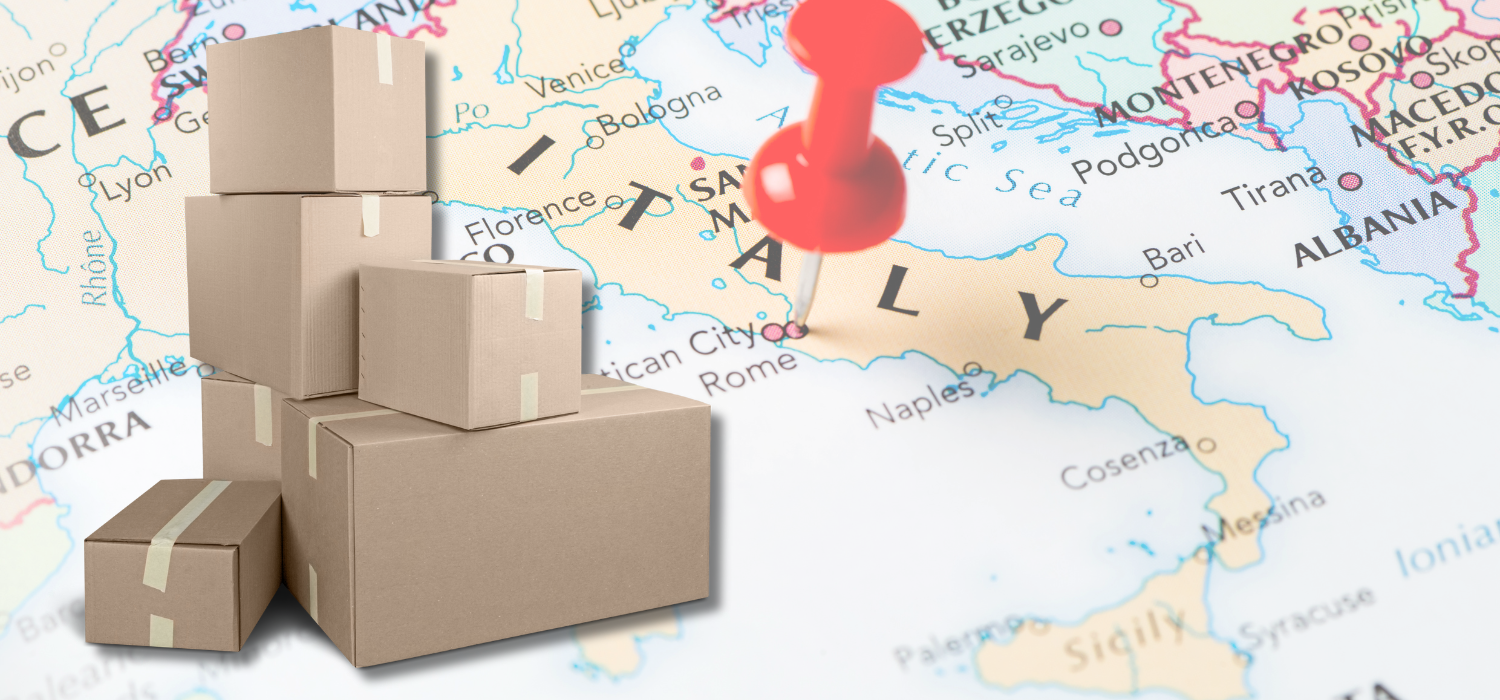Over the next few days, the 18th edition of Casaleggio Associati’s ‘Ecommerce in Italy’ research will be presented in Milan. It has become a regular – and eagerly awaited – appointment for discovering innovations, the latest trends, the most interesting cases, and the novelties of the near future in the e-commerce market.
Among the topics at the centre of the 2024 research will be innovations in logistics and shipping services. But what should we expect on this front in the near future, and what are the most interesting innovations?
We asked Davide Casaleggio, CEO & Partner of Casaleggio Associati, as well as curator of the research ‘Ecommerce in Italy’, strategic consultant for digital innovation and expert in the definition of online business models and research in the field of exponential technologies, for a preview.
Davide, first of all thank you for your availability. Let’s start with a claim from one of your recent studies: ‘Without innovation, there is no growth’. So what are the most interesting innovations in the eCommerce landscape that will enable the sector to grow in the near future?
A key theme is Artificial Intelligence. More than a third of operators think there will be significant impacts by 2024 and more than another third think there will be impacts by 2026. Only three per cent think it will not bring significant impacts. Artificial Intelligence is likely to have a greater impact than we have seen with electricity or the digitisation of the economy, and it will not be spread over decades, but over a few years. Today, in fact, there is no need to create a new infrastructure to be able to employ AI in production processes and it is therefore poised to give a major boost to productivity, i.e. the time it takes to produce a certain good or service, by significantly reducing time. With regard to customer service, for example, early estimates indicate an impact of 14 per cent more customers being handled by one person at the same time. This means that virtual assistants will become central. Already today in Italy, 22.3% of people use voice assistants at least once a week. Would you find it strange if your Alexa, Siri or Google Home suggested birthday presents to your friends based on the exchanges you had on Whatsapp or Facebook during the year? What if they then went looking for the best offer and proceeded to purchase? I don’t. Amazon has already announced that Alexa has developed its LLM. This will be the beginning of the transformation of eCommerce as we know it today. It is therefore time to create the new business models, just as in the 1990s it was time to think about eCommerce after the advent of the Internet.
Let’s talk more specifically about news on the delivery front. From your point of view as a privileged observer of market trends, what do you think we should expect?
The strong acceleration of the eCommerce sector over the last two years has led to the internal organisations of companies being challenged. Operators that have consolidated their online offerings are now planning same-day delivery in major Italian cities such as Milan, Rome, Naples and Turin. In the last two years, therefore, shipping services have come under pressure. Logistics, in most cases, still remains the responsibility of the company. In the last three years, however, there has been a sharp increase (from 2% to 10% to 18%) of companies outsourcing their logistics to marketplaces (especially Amazon). These figures can probably also be related to the increase in satisfaction (from 25% to 36% to 41%) with the shipping service. Consequently, in order to spend an increasingly fast (and therefore expensive) service, the average shipping price increased to EUR 10.59 compared to EUR 8 last year.
In recent months, however, a phenomenon in direct counter-trend is taking place: in exchange for cheaper prices, people are favouring significantly slower deliveries for certain product categories, particularly those offered by Chinese platforms and with the dropshipping model integrated with social media such as TikTok. Finally, there is also an increased sensitivity to the ecological impact of fast home deliveries.
Lately there has been talk of the need to spread an ‘Out Of Home culture’. To spread a new culture, however, a communication strategy is needed. As a great expert in this field, do you have any advice to give to merchants, logistics operators, technology providers and more generally all those who can play a role in this process?
Today’s customers are increasingly demanding, especially when it comes to shipping, as they want punctuality, efficiency and flexibility, which is why Out of Home shipping is becoming increasingly popular.
As part of the initial and terminal phase of the logistics service, there are already companies operating automatic lockers – so-called Lockers, placed in private buildings or at commercial or public locations – for the collection and delivery of parcels. The Locker Networks (called PUDO, or Pick Up/Drop Off) in Italy have reached a fair capillarity (e.g. the Networks of Poste Italiane, Indabox, Amazon and DHL exceed 3,000 Points). Some Networks operate on an exclusive basis (such as the Buffetti Shop Network), while others are multi-operator (such as the Indabox Network, InPost, Fermopoint, MBE and Ki Point of the Poste Group). In addition, three operators (Fedex/TNT, Poste Italiane and Amazon) directly own a Locker Network. Finally, there are systems that aggregate collection points of different operators in order to manage them in an integrated way, just like Gel Proximity. The evidence therefore shows that the organisational structure will be expanded by Italian eCommerce companies, especially in terms of Payment Solutions (34%), Free Shipping/Returns (16%), More Sustainable Packaging/Shipping/Transportation/Charges (18%), Personalised Shipping (13%), Click & Collect / Locker / Delivery community service (11%) and Security Measures in terms of data protection (4%).
The issue of more sustainable transport is certainly also a political issue. It is Europe, first and foremost, that is pushing in this direction. So what role can politics play in a more optimal management of the last mile?
Politics can play an important role. Ways in which policy can positively influence this management include:
- Regulation and legislation: governments can introduce regulations and laws to incentivise the use of more sustainable means of transport for the last mile, promoting the use of electric vehicles and bicycles, or instituting restrictions on access to conventional vehicles or the use of polluting fuels in urban areas.
- Financial incentives: Policy may offer financial incentives in the form of subsidies, tax breaks or funding for the purchase of electric vehicles or for the development of sustainable transport infrastructure for the last mile.
- Education and awareness-raising: policy can play a key role in educating the public on the importance of sustainable transport and promote a cultural shift towards more eco-friendly last-mile travel habits. This could include awareness-raising campaigns, educational programmes in schools and the organisation of community events focused on green transport.
In summary, policy can act as a catalyst for a more optimal management of the last mile by providing incentives, regulations and planning strategies that encourage the adoption of sustainable transport practices and reduce the environmental impact of transport.
In Casaleggio Associati’s recent research ‘The Partners of eCommerce Companies’, GEL Proximity was listed among the top players for Logistics and Shipping Services. Do you think merchants are investing enough in the implementation of new logistics services that support digital consumers’ demands for personalised delivery?
Logistics and shipping are one of the most important aspects of eCommerce management. For an eCommerce Manager, ensuring an efficient logistics system and timely shipments is not only a matter of customer satisfaction, but is central to the reputation and sustainable growth of the business. In an increasingly competitive market, consumers have high expectations regarding the timing and accuracy of deliveries. A delay, a damaged parcel or ineffective handling of returns can lead to a loss of trust and, consequently, a loss of customers. Furthermore, optimised logistics can result in significant cost and resource savings by optimising the entire supply chain. Therefore, devoting attention and resources to logistics and shipping is not only an operational necessity, but a winning strategy to ensure customer satisfaction and long-term eCommerce success. Before proceeding with the choice of a logistics provider, therefore, it is crucial to precisely define one’s logistics needs. This includes determining the geographical shipping areas, understanding the specific needs related to the nature of the products, and assessing the volume of orders. Once these needs have been identified, it is advisable to look for a supplier with specific expertise in the logistics area of interest. A good logistics provider not only manages operations, but also represents the company’s brand in the eyes of the customer. Therefore, it is essential that it offers high-quality customer service, handling complaints and tracking deliveries efficiently. The careful choice of a logistics partner can determine the success or failure of an eCommerce business.
We thank Davide Casaleggio for his availability and look forward to the next interview!













